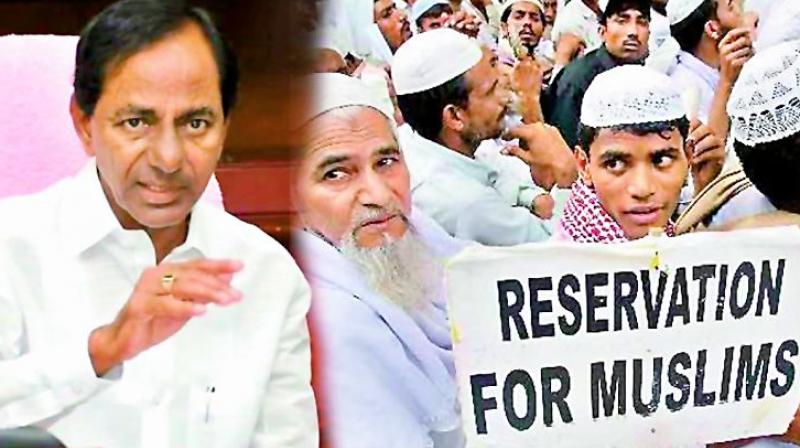Quota based on caste allowed, not on religion

Hyderabad: Legal experts say that making Bills promoting reservations for various sections and forwarding them to the Centre for approval, when the reservation crosses the cap of 50 per cent, shows the ploy of state governments.
The Constitution has empowered only state governments to grant reservations to the backward classes. The Centre had no role either to approve or disapprove the act of the state governments when they extend reservations to a particular group based on its backwardness.
In the wake of the Maharashtra government passing the Bill giving 16 per cent reservation to Marathas, the issue of Kapu reservation in Andhra Pradesh and 12 per cent Muslim reservation in Telangana, is being debated by legal eagles of the Hyderabad High Court.
By giving 16 per cent reservations to Marathas, the total reservation in Maharashtra has reached 68 per cent, well over the 50 per cent mandated by the Supreme Court ruling in the Indira Sawhney case, based on Clause (4) of Article 16 of the Constitution.
The Maharashtra government has sought to get round the Supreme Court’s 50 per cent cap by banking on the 81st Constitutional Amendment Act, 2000. If Maharashtra succeeds in exceeding the cap by resorting to the 81st Constitutional Amendment Act 2000, it will set a precedent for others states, including AP and Telangana, to do likewise.
Sarasani Satyam Reddy, senior counsel of the Supreme Court, says that even if Maharashtra succeeds in exceeding the cap, it will not set a precedent for the Telangana state government to provide 12 per cent reservations to Muslims in the state because the Constitution does not permit religion-based reservation. The Maharashtra government has provided reservation to the Maratha community by treating it as a backward caste.
The contentious issue of religion-based reservation, which has been raised in the case of Muslim reservations in Andhra Pradesh and Telangana is pending before the Supreme Court, Mr Sarasani Reddy said.
In the case of Kapu reservations in AP, he said, the state government can go the way of Maharashtra.
S. Sriram, senior advocate who had appeared in the Muslim reservations case during the Congress regime, said that to give reservation to a particular group or groups the state government has to first constitute the Backward Classes Commission to enquire into the backwardness of the caste for which the reservation is to be given, and then make a law-based on the recommendation of the commission for extending the reservation to the particular community.
He said that if a state government wants to exceed the 50 per cent cap, it must show the extraordinary circumstances and extraordinary material to prove its case.
He said the state government also has to seek concurrence from the Union of India to validate the extended quota by Parliament through Article 31 (B) of the Constitution, including it in the 9th Schedule of the Constitution.
He said that the concept of reservations comes under Article 15 (4) and 16 (4) of the Constitution.
Articles 330 and 335 of the Constitution stipulate that the reservation for Scheduled Castes and Scheduled Tribes will be in proportion to their population, Mr Sriram said, but Backward Classes reservation does not have to be in proportion to their population. He said even if Parliament incorporates the Marathas Reservation Bill in the 9th Schedule of the Constitution, it cannot escape judicial scrutiny.

